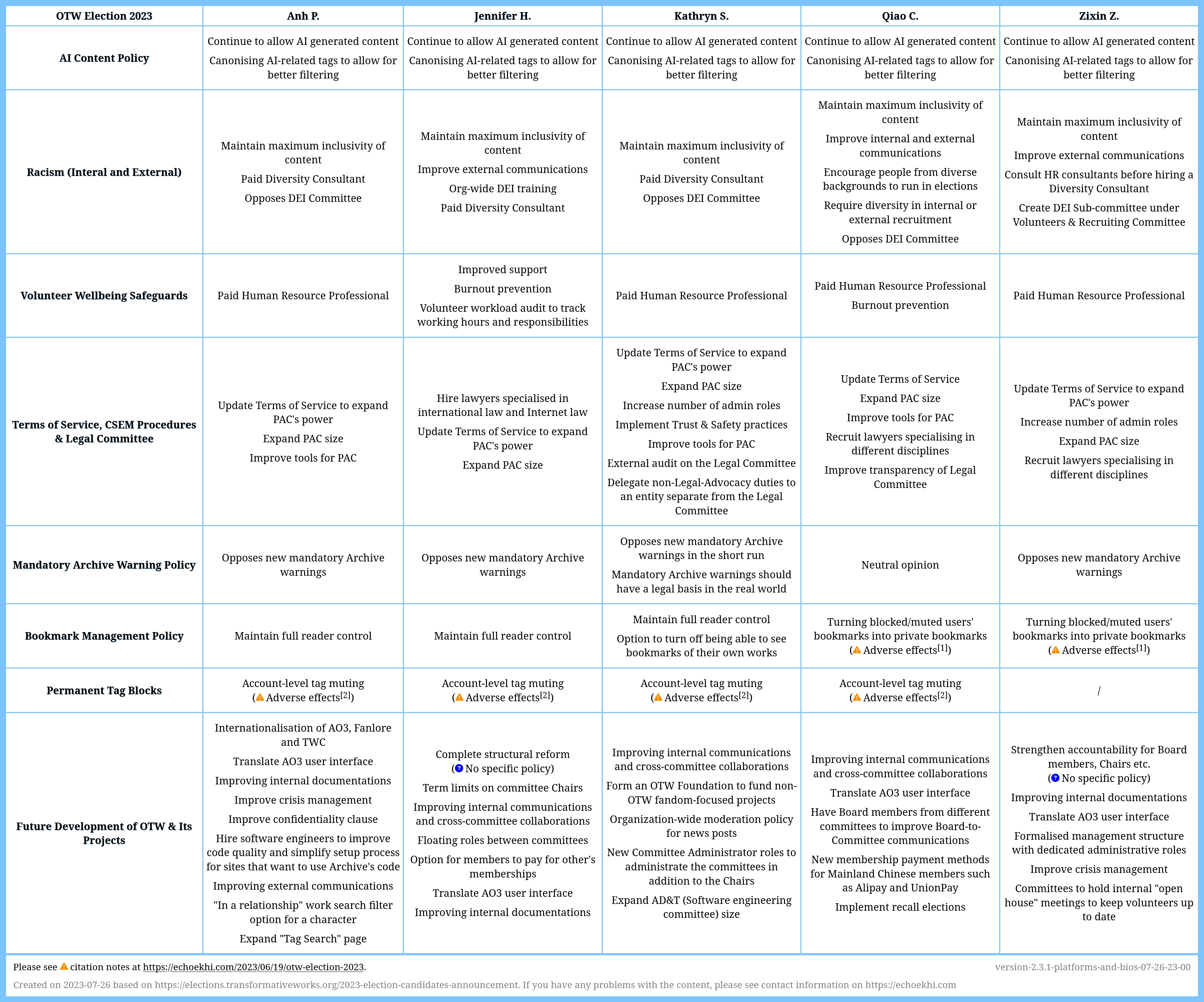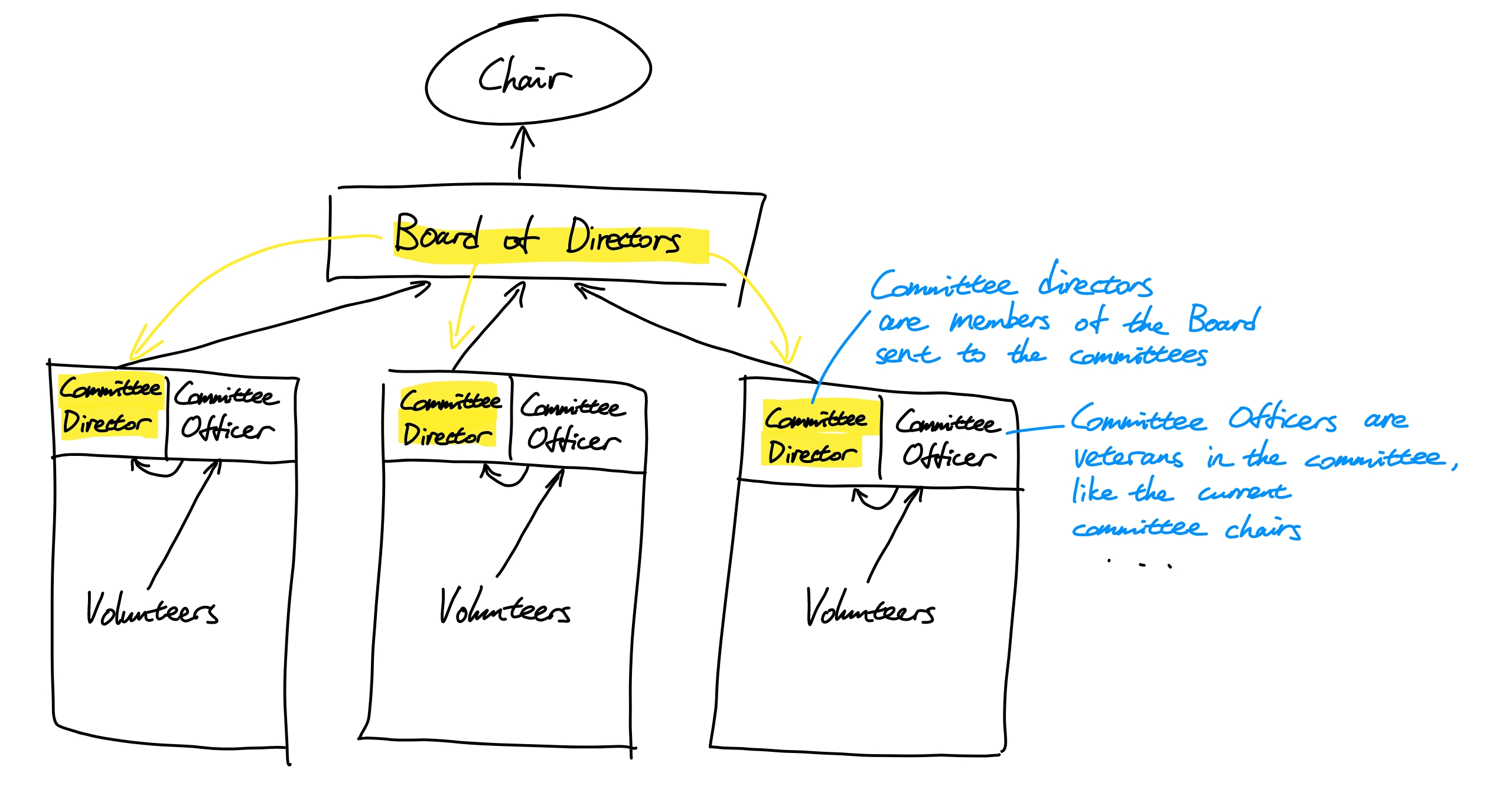Summary of Candidate Positions & Policies

Alt text of the image: https://echoekhi.com/2023/06/19/otw-election-2023/table.html
Source: https://elections.transformativeworks.org/2023-election-candidates-announcement/
Citation notes:
- [1]: Bookmark blocking policy
- [2]: Permanent Tag Blocks
My Own Analysis on Specific Policies
AI Content Policy
While AO3 is intended for (human) authors to share their fruits of labour, outright banning or requiring compulsory tags for AI generated work is a short-sighted decision on technical and practical grounds.
There is no reliable way to detect AI generated works in the Archive to ban or police them. Changing the Terms of Service (TOS) to disallow or regulate AI LLM works will make the TOS unenforceable and will be superficial at best, and would fuel false accusations and cyberbullying at worst. Allowing AI LLM text protects authors from cyberbullying and abuse, as it eliminates any significance of accusations of ‘cheating’ with AI and the author can rest assured that accusations would not lead to the deletion of their work as the TOS would not be violated.
Using technical measures to prevent data scraping via web crawling is also unrealistic, as such a policy would require a CAPTCHA, imposing significant accessibility challenges on those who are visually impaired, has a slow Internet connection, relies on VPNs to access AO3, or is stuck with an outdated device (by western standards), further marginalising already marginalised groups. It would also block legitmate automated data collection, such as search engine indexers and fans backing up works on archive.org.
Turn blocked/muted users’ bookmarks into private bookmarks
While this policy appears to be effective at preventing authors from being harassed via bookmarks, it ignores a fundamental use-case of bookmarks: Rating & reviews.
If this policy is implemented, it would mean authors can hide any bookmark they don’t like from public view. If a reader gives a work a non-favourable review on a bookmark (by marking it as 1/10 or ★☆☆☆☆), the author can just effectively delete it from the archive, which defeats the purpose of reviews. This policy is especially concerning when you take into account that the bookmarks could contain additional content warnings to enable other readers to avoid certain works.
It also ignores the principle of ownership: a comment on a work is (partly) owned by the work’s author, but the bookmark is entirely owned by the person who created it. Enabling the author to hide anyone’s bookmarks is overreaching into the ownership of the bookmark. If an author finds a bookmark distressing, they can simply mute the account. If the behaviour is targeted harassment, they can also report it to AO3 to get it deleted. But if the bookmark is just good-faith commentary, then I believe the author should not have the power to change the bookmark’s visibility.
New Archive ‘Bigotry’ Warning Tag
Some people have suggested that “Bigotry” should be added as one of the major warnings on the Archive, thus granting the tag a compulsory status (unless the author specified “Creator Chose Not To Use Archive Warnings”). This has problems with enforceability, as it could be difficult for Policy & Abuse to tell if a work is bigoted or not, because the concept of bigotry is a spectrum, not a clear yes/no unlike other Archive Warnings. It also brings about the question of what to do with the 11 million works already posted on the Archive – should they be retroactively tagged, or simply marked in some way as untagged? Is this really going to be effective, given that PAC (Policy & Abuse Committee) can only add the “Creator Chose Not To Use Archive Warnings” (CCNTUAW) warning to works, so there would be a sea of CCNTUAWs and readers would not be effectively warned anyways? Finally, is the new compulsory tag really necessary, given that optional additional tags already exist and are already being used?
I particularly like one candidate’s stance on this matter. To quote Kathryn S.’s response in the 2nd Q&A, “The best decision in the long view may be to only have mandatory warnings that have some sort of legal basis for existing”. I think this is very sensible, as it sets a highest common factor of what different people find disturbing, and it would prevent a “warning sprawl” situation where different people advocate for different warnings to be added, even though they would not be of use to the majority of readers and would contribute to tagging fatigue on the part of authors.
In the short run, there could be an information campaign about racial sensitivity through official OTW channels, encouraging authors to pay special attention to the tagging of works involving racist themes or stereotypes. A tip could be added in the work edit page to say something like “Make sure to tag any potentially triggering content in your work, such as sexism, racism etc.”
Permanent Tag Blocks
There is also the suggestion of permanent tag blocks, such that users would never see works with a certain tag on search results. Technical challenges of this aside, if lots of readers block a particular tag, would writers simply not use the tag, in the hopes that their works would show up on more people’s search results? That would place AO3 in a worse position overall – works would not only be unfilterable, but no warnings would exist at all. We should be careful not to create a site feature which actively discourages writers from tagging their works accurately, as it would undermine the effectiveness of the tag search system AO3 is renowned for.
I understand my take on this is controversial, so here are some FAQs before you shake your head in disappointment:
- Authors won’t be bothered by this, and they will continue to tag accurately anyways.
While that may be true for some authors, it certainly won’t be true for every author. There is a precedent to this: Twitter has a word-mute function, and its users have been doing things like writing “el*n mu*k” or “an*i” in a deliberate attempt to circumvent the mute. Is this the AO3 you want?
- There’s a niche audience for every tag, so the people who actively search for the tag will compensate for the audience lost for blocking the tag.
What about content warning tags like “Period-typical Racism” and “Transphobia”? It’s not likely that a significant number of readers actively look for tags like these for things to read. These are the tags that will be omitted by authors if this feature is implemented, and it would be a really big problem since effective content warnings are such a vital part to the AO3 ecosystem.
- The exclude tags function already exists. This would simply be an extension.
There is a fundamental difference. Tag excludes are explicit, while tag blocking is implicit on every search. An author may think it is acceptable for people to avoid their work explicitly, but unfair that their work is hidden from the search results of a significant part of their potential audience implicitly. Tag blocking would have a much larger impact on the search exposure of a work than tag excluding in search, and that is the main problem.
- There has always been malicious authors; Those who tag honestly will continue to do so, and those who don’t aren’t doing it now anyways.
All the more reason why we shouldn’t encourage authors to tag dishonestly by rewarding dishonesty with more search exposure. This feature would provide an incentive for everyone to under-tag content warnings on their works, which is ethically problematic.
- The mute feature exists. If I see a dishonest author, I will mute them and never see them ever again.
While this does, to an extent, balance the incentives a bit (an author doesn’t want to be muted), the damage is already done. The reader has already read a significant amount of content, enough to realise the fic is not what they wanted to read, and potential harm has already been done. Not to mention that guest users don’t get to use the mute feature, so the impact on incentives is limited.
(If you think of another argument on this, please kindly let me know in the comments.)
A better alternative to tag blocking would be to extend the muting feature to mute individual works, as well as authors. Often someone just wants to get rid of that one work that shows up on their search, but doesn’t want to mute the rest of the works by that author. This is very technically feasible and it would have minimal impact on the performance of the system. Currently, this is possible through custom site-skins, but I feel it should be made more accessible and user-friendly.
Improve Internal Communications
The candidates have yet to propose specific policies on this end, so I would like to propose a specific and practical solution: launch an internal social media platform. It would be exclusively for OTW staff members, much like how Facebook was exclusively for Harvard students when it was first created. It would allow easy communication between any members of staff, and there could be “tweets” about what a committee or member is working on at the moment, so other members can provide opinions and support. After all, the size of 900+ people more than enough justifies a dedicated social media platform.
It wouldn’t even be technically challenging. Just deploy an instance of Mastodon and turn off all the federation features! Mastodon is open-source and easily deployable, they can get this up and running over a weekend.
Paid Human Resource Professional
I have long advocated for a committee dedicated to volunteer wellbeing. The candidates are taking it one step further and have proposed the hiring of a professional employee, and they have my fullest support.
However, there are financial considerations to this. If they are going to hire a full-time employee in the US, it would cost them conservatively $50,000 per year. In context, the OTW’s net income was $93,564.94 in 2022. They could lessen this by hiring from a country with a lower average salary, hire a part-time employee, or contract a HR management firm, nevertheless it would still be a significant increase in the operating expenses of the OTW.
I suggest, if the OTW is going to have paid positions, they should raise the membership donation threshold from $10 to $15, bearing in mind $10 back in 2007 when the OTW was founded is equivilant to $30 in 2023. A Steam-like price difference system could be adopted, where people from lower-income countries are required to pay less, and higher-income countries pay more, making this increase more politically acceptable.
Also, the OTW should start putting its reserves in low-risk portfolios so it can generate some additional income. Further reading on the finances of the OTW
CSEM Procedures, Terms of Service Revision & the Current Legal Committee
There has been calls to fire the whole of the Legal Committee on the grounds of alleged incompentence and ignorance. I think that is unnecessarily extreme, and would lose the Org significant Legal Advocacy powers in the field of copyright and fanwork legality.
I propose the recruitment of a specialised Trust & Safety lawyer into the Org, as a volunteer or otherwise; It would:
- Reduce workload on the current Intelletual Property Lawyers, allowing them to focus on their Legal Advocacy work;
- Improve collaboration and productivity with Policy and Abuse Committee (PAC) to amend the ToS when new types of harassment appear;
- Provide better advice to PAC by having specialist knowledge in the field of Trust & Safety.
Accountability for Board and Chairs with a Formalised Management Structure
Currently, there is very little accountability inside the Org: The Board takes collective responsibility for everything that goes on inside the OTW, while the Committee Chairs aren’t elected and therefore aren’t democratically accountable to members.
In my reform, the management structure would look like this:

Directors on the board would be delegated to one or several committees each, to serve as the committees’ directors. Old committee chairs would become Committee Officers, responsible for the day-to-day operations of the committee, using their subject-area expertise. Committee Directors would make policies and future plans for the committee, whereas Committee Officers will carry out the policies. Officers will report to directors, and the directors would meet at the Board and report to the Chair. Additionally, important decisions taken inside of a committee will require a written approval from its director, making decisions democratically accountable.
This ensures there is accountability at the committee level; No longer would the Board be able to simply say something happened in a committee without its knowledge. It would also limit the power of the current committee chairs, as there would be democratic and effective oversight over their deliberations. It would even make the Org more efficient, as policy and administration concerns are separated, taking some of the workload off the current committee chairs.
There are 18 committees, but only 7 board members (sometimes even fewer due to mid-term resignations). I propose that the next Board expand their size to 10 or more directors (the Bylaw currently restricts it to 12), so the board can better manage these committees based on this management structure.
Translation of AO3 Interface
This is the one I’m most excited about, as it would massively improve the experience of millions of users. I have worked on translating AO3’s interface in the past, and I have first hand experience of how much work is required to achieve this mammoth goal.
I suggest OTW use its public communications to encourage more contributors to help with the Archive’s code. The code behind AO3 is an open-source project, and it would greatly welcome more developers working on it.
The specific workflow of translating the interface is a painstakingly time-consuming and tedious one: You would need to replace every single hard-coded string (of which there are at least 4590 at the time of writing) and turn them into references to a localisation file, not to mention the work needed from the Translation Committee to translate all of them. It is, however, not very technically challenging, and with a bit of guidance, anyone who knows HTML well enough is able to chip in. The OTW can look into encouraging more people, especially programming beginners, from its community to help with this effort.
A Call For More Votes
The deadline to donate in order to vote in the upcoming election is June 30th. If you want to vote this August, please consider donating $10 or more to become an OTW member. This year is particularly important, as one election will decide the majority of the Board, the first time in 12 years.
Don’t forget to judge the candidates’ policies on these criteria:
- Practicality;
- Sustainability;
- How specific and detailed it is;
- Have limited and manageable side-effects.
Please vote sensibly, don’t stick to a single agenda, and remember to look at the candidate as a whole.
Comments
Please leave your comments on the Mastodon and Twitter posts below.
https://mastodon.social/@EchoEkhi/110571185460007290/embed
OTW Election 2023: A Brief Breakdown and Analysishttps://t.co/k6DosnBg1l
— EchoEkhi (@EchoEkhi) June 19, 2023
